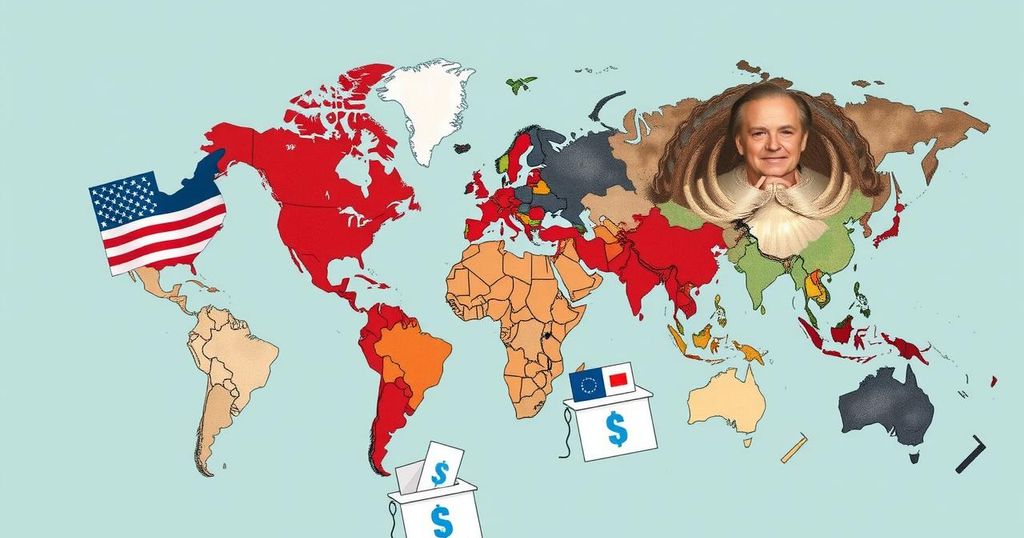Global Elections 2024: Voter Discontent and the Rise of Disruption
The year 2024 witnessed a global electoral shift, with voters rejecting incumbents across multiple nations due to dissatisfaction resulting from economic disruptions and social unrest. Key historical defeats occurred in countries such as India and South Africa, as the rise of populist and far-right movements marked a changing political landscape. Allegations of foreign interference highlighted vulnerabilities within democratic processes, suggesting that electoral challenges may persist into 2025.
In the tumultuous electoral landscape of 2024, voters globally expressed their discontent, significantly challenging incumbents across approximately 70 nations that collectively house half the world’s population. This year saw a notable trend of rejection for sitting governments, as economic disruptions and global conflicts led to mass dissatisfaction. Political scientists attribute this phenomenon to lingering effects from the pandemic, with high inflation and social unrest further aggravating public sentiment.
In several regions, notably South Africa, Senegal, and India, longstanding parties and leaders suffered historical defeats. For instance, the African National Congress, which has ruled for over three decades, experienced a substantial setback, while Indian Prime Minister Narendra Modi’s party lost its parliamentary majority following a decade of dominance.
The political scene was increasingly marked by polarization and the rise of populist and far-right movements, especially in Europe, where traditional parties faced significant challenges. Despite victories for some right-wing factions, considerable voter fragmentation emerged in places like the United Kingdom, as diverse smaller parties gained traction.
Notably, the year also exposed vulnerabilities within democratic systems, highlighted by allegations of electoral interference and disinformation campaigns, primarily attributed to foreign actors such as Russia and Iran. The unexpected election of far-right politicians in countries like Romania and the attempts at manipulating public opinion through social media have raised alarms regarding democratic integrity.
As 2024 concluded, uncertainty loomed over various nations, primarily following Donald Trump’s re-election in the United States. Political turmoil continued in regions including Venezuela and Mozambique, where allegations of election fraud further destabilized governments. This ongoing sense of unrest indicates that challenges facing democracies may intensify into 2025, as electorates demand accountability and responsiveness from their leaders.
The year 2024 has been marked by significant electoral upheavals, with a marked trend of voters discontent leading to the ousting of incumbents in numerous countries. This widespread dissatisfaction can be traced back to the economic and social ramifications of the COVID-19 pandemic, which have left many citizens feeling vulnerable and unhappy. Rising inflation, geopolitical tensions, and the aftermath of numerous conflicts have exacerbated this unease, prompting voters to look for alternatives to traditional ruling parties. Many established leaders who once held dominance found themselves confronting unprecedented electoral challenges, often resulting in the rise of more extreme political factions.
The electoral dynamics of 2024 ultimately highlighted a profound dissatisfaction with incumbents, driven by economic turmoil and social unrest. The rise of populist movements and the realities of election interference pose significant challenges for the preservation of democratic norms. As nations brace for the upcoming electoral cycles in 2025, the call for better governance will likely persist, compelling leaders to address the root causes of public concern and restore faith in their democratic systems.
Original Source: www.seattletimes.com




Post Comment